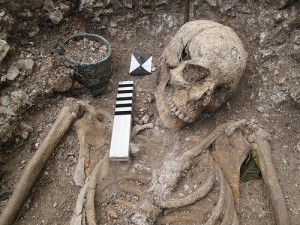With such importance placed on rituals and disposal of the body, we think we have taken care of the body and given it a final resting place. But what if someone was to come along and dig it up? We would be outraged, demanding the return of the body and punishment for the perpetrator right?

Saxon Burial (Photo from Wessex Archaeology http://www.flickr.com/photos/wessexarchaeology/8469631615/sizes/m/in/photostream/)
Well, this is exactly what archaeologists do when they encounter ancient burials. They methodically remove the contents of the grave (including the body) and scientifically examine the remains. An Anglo-Saxon sarcophagus, for instance, has just been opened for examination:
http://www.archaeology.org/news/1528-131118-england-lincoln-castle-sarcophagus
Is this ethical? Usually, no one makes a fuss when it’s a pagan burial, such as one from Druid culture or ancient Greek culture, but what if it was a Christian burial? Archaeologists will excavate relatively recent remains (in their viewpoint) from only a couple centuries ago. A field school in Italy explicitly excavates in a churchyard cemetery:
http://www.fieldschoolpozzeveri.org/
How recent is too recent though? When a body must be exhumed nowadays, it is very traumatic for the family and many people say that it is disrespectful to the deceased person. Is excavating a grave the same thing? Is it okay since there is no living family or community connected with corpse? An article from the Economist (http://www.economist.com/node/1056932) discusses how ethics come into play in burial archaeology. When dealing with human remains, archaeologist must be respectful of how the cultures would want their remains to be handled and they often come into conflict with native people (such as the conflict with Native American tribes as mentioned in the article).
We must weigh the benefits against the damage that burial archaeology entails. I think that what we learn by excavating these graves outweighs the damage that excavation causes. We learn about the culture of the deceased person as well as general trends of how humans deal with death. Just like exhuming a body for forensic analysis in a criminal case will be worth the emotional pain for the valuable evidence it provides.
